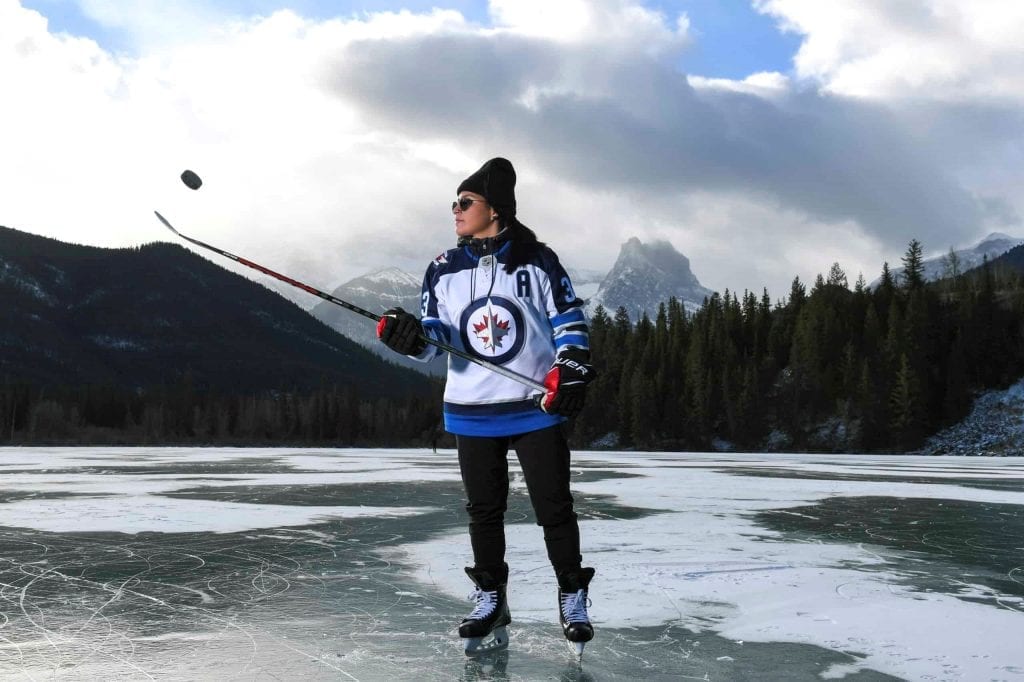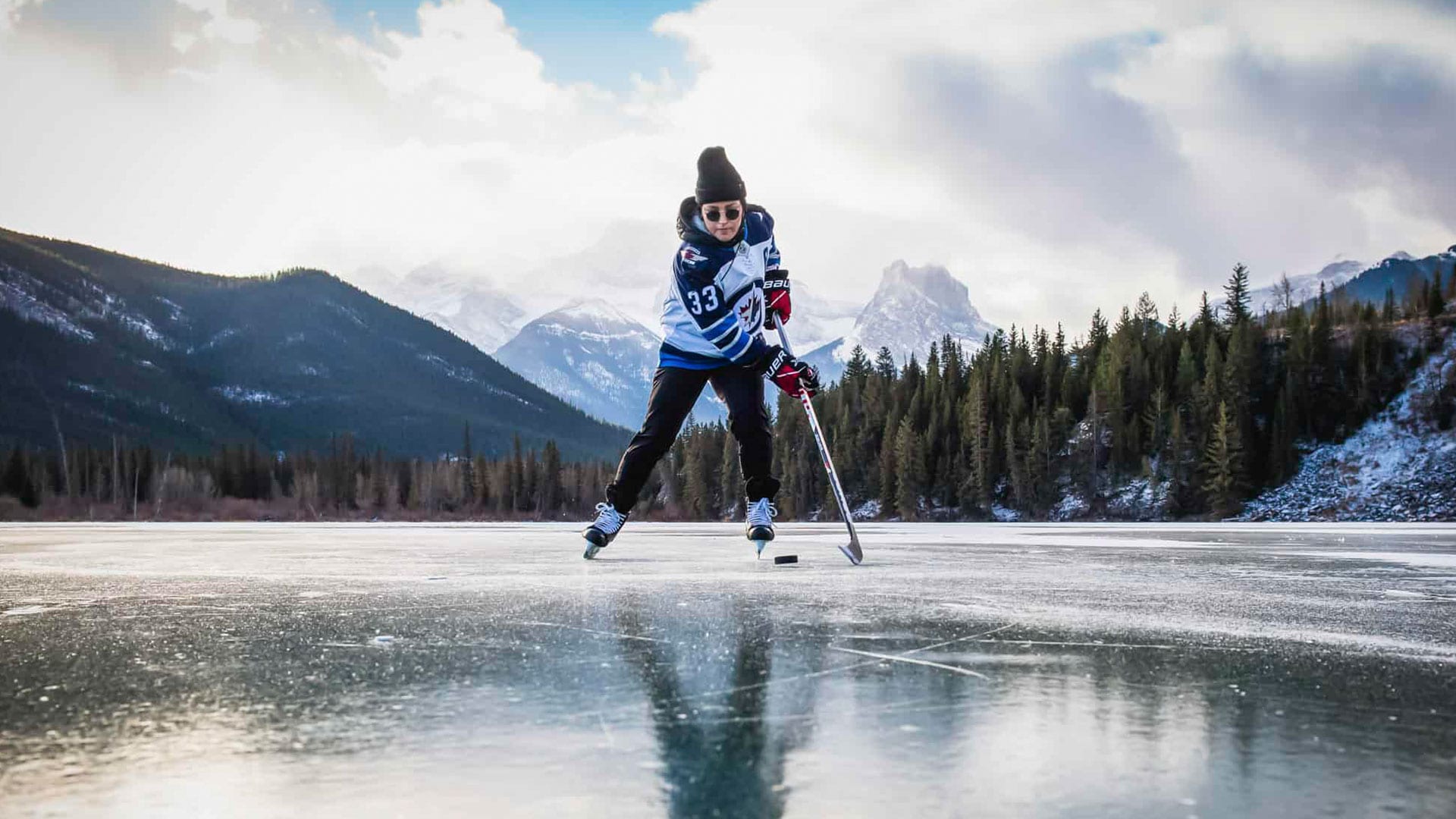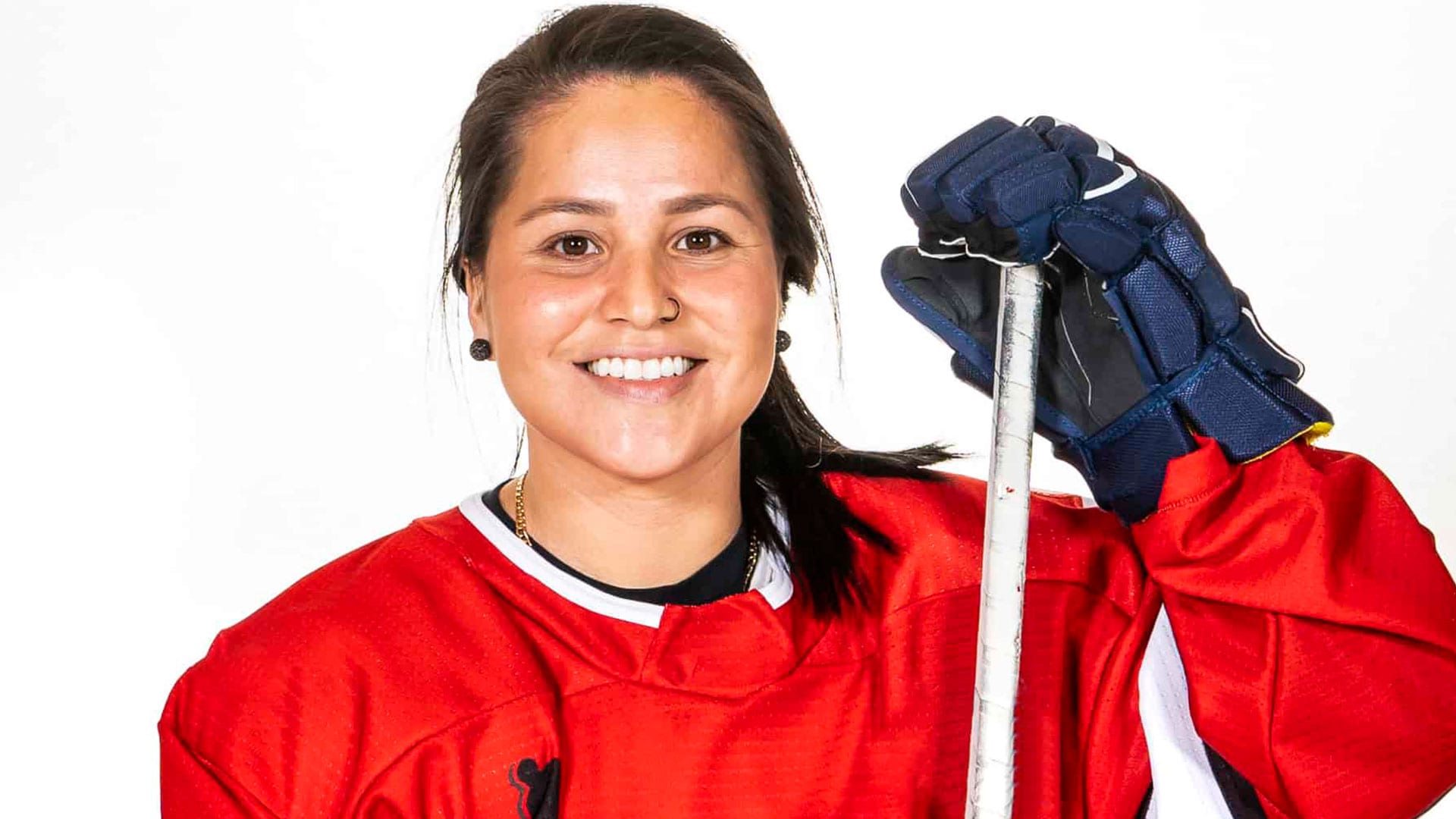
Olympic athlete Brigette Lacquette helps inspire other Indigenous youth to pursue their dreams. Photo by Candice Ward Photography
While some kids were throwing snowballs at each other or cozying up by a fire during long, harsh Manitoba winters, five year-old Brigette Lacquette was chasing her dad around, begging him to put her into hockey.
Eventually her dad gave in, and now, 23 years later, the 28-year-old from Cote First Nation is competing to participate in her second Olympic games.
Laquette says dad tried to protect her from hockey, which was considered a “rough,” male-dominated sport at the time.
But she followed him around anyway, going to every one of his rec and balls tournaments, until he could no longer deny her passion for sports and changed his mind.
Sports were her outlet, a place to escape, a place that made sense, Lacquette tells IndigiNews over the phone.
“I have eczema, so I struggled with that. It was really bad when I was younger and I kind of got made fun of, bullied, and didn’t really have a lot of friends and, you know it was tough, but sports and hockey was kind of my out,” Lacquette says.
She grew up in a small Métis settlement in Mallard, Manitoba, four hours north of Winnipeg, and is a part of the Cote First Nation through her mother.
On top of being bullied, she had to deal with racism, hurtful comments from players and strangers alike.
When she brought the comments home, to her family’s kitchen table, her dad told her to “beat them on the ice,” so she did.
‘A full family effort’

Lacquette played hockey on the boys’ teams until Grade 11, when she started to play for both the boys’ and girls’ teams.
Her home community has one gravel road to get in and one to get out, she says. No school. No band office.
“Nothing but a pump house and houses,” she says. “The nearest town where we got our groceries was about an hour away.
“We had to travel a lot for hockey — it was a lot of traveling, a lot of time spent on the road, but my parents made it work.”
Lacquette describes those days as “a full family effort.
“I have five uncles. All my dad’s brothers took turns taking us to practice when my parents couldn’t,” Lacquette says. “When I first started playing hockey, my parents were on welfare. They had us young.”
Lacquette says her mom wanted to give the family a “better life,” so she went back to school to get her GED and a teaching degree.
Meanwhile her dad worked as a bus driver.
“He didn’t go back to school until I was a second-year sophomore in college, so it was kind of a full family effort in a way where my mom was off going to school and my dad was driving the bus, and he had three kids in hockey and, you know, they, they went into debt, putting us into hockey,” Lacquette says.
To this day, Lacquette says she doesn’t know “how they did it,” but her dad always made sure they had “the best stuff” and would sometimes tell her, “Well, now you don’t have an excuse not to make it.”
The pressure was on.
But it wasn’t hard for Lacquette to commit long hours to hockey.
“I loved it. I could spend hours out on the rink skating, shooting and stickhandling and just being out there by myself. It was a passion at a young age,” she says.
Lacquette’s dad made a rink outside their house in the winter, where she and her siblings spent a lot of time testing out their breakaways on him.
“He spent hours out there with us,” Lacquette says. “We would watch hockey, NHL games, and he’d see something that the defenseman did and be like, ‘Okay, we’re going to go try it out.’ So he was able to kind of break the game down that way.”
One summer, her dad bought them rollerblades.
“He took us to the nearest highway, which is about 15 minutes away from Mallard, cause it’s just a gravel road to get in. And my brother and I would be in like pretty much full equipment and our rollerblades, and we’d be rollerblading from hydro pole to hydro pole,” Lacquette says.
“He’d be in his car, kind of just training us, I guess.”
Lacquette had other spots too, like the cement pad behind her school where she’d test out her figure eights and edges.
All those hours eventually paid off, and Lacquette got good, really good.
When she was 16, Lacquette was invited to try out for Team Canada.
She was playing in a National Aboriginal Hockey Championship in Sault Ste. Marie, Ont., when a woman approached her and her sister and invited them to the training, which was taking place the following month.
Lacquette says she remembers feeling confused by how fast it all happened.
“It made me nervous because it was a fitness camp. You have to get a certain number on the beep test, bench a certain number, and I hadn’t had any organized strength programs in my life. I just chopped wood, went for runs and rollerbladed,” Lacquette says.
The sisters made it past the first camp, and the second camp, and while her sister got cut after that, Lacquette ended up making the summer team.
“Everything started to fall into place,” she says. “I made Team Manitoba, I got top defenseman at the national championship, and I made Team Canada.”
Lacquette was the first First Nations woman to make the Team Canada Women’s Hockey team.
After that, Lacquette’s dad was approached by many coaches and scouts. She decided to go to the University of Manitoba, but it didn’t fit.
“I felt like I should be somewhere else. Six games in I told the coach I was transferring,” she says.
She transferred to University of Minnesota, Duluth, where she had a full scholarship and “a really good two years.”
She made the U22 Team Canada, and as a sophomore in College was asked to try out for the 2014 Olympic team. She entered the camp having no idea what to expect, she says.
“I’m very hard on myself on the ice, so I don’t see what other people see,” Lacquette says. “I’m getting better at it now.
“Through college I ended up partying, not taking hockey that seriously, just relying on my skill. I got cut that year. I took it really hard. I wanted to quit hockey.”
After getting cut from the Olympic team, she says she didn’t work for six months gained 30 pounds, and soon realized she needed support.
“I ended up making the world championship team in 2015 and 2016 and thought I could still live this life and make these teams, but I reached a point in 2017 where I wasn’t happy with where I was at. I felt like I was wasting everyone’s time, and I wasn’t being true to myself,” Lacquette says.
“Coming from a community where a lot of the kids, all they know is, you know, is drugs and alcohol and stuff like that, so I just felt like I was kind of letting everyone down in a way, and [letting] myself down.”
‘Congratulations Brigette, on becoming an Olympian’
She reached a point where she realized, “This isn’t who I am,” she says. When she drank, she felt like she changed as a person, and while she didn’t want to live a double life anymore, she also knew she couldn’t maintain her lifestyle and keep playing high level hockey.
Lacquette decided to reach out for support.
She texted her dad, she says, who stopped drinking when he was 24 and she was just two.
She also texted her friend Michael Ferland, a Cree player with the Vancouver Canucks. She says he told her if she’s going to make the decision to change things up, she had better be serious about it.
“I made the decision to stop drinking in January of 2017 and told Team Canada and told the GM and the head coach and they were super supportive and they were like, ‘We’ll do everything we can to help you out,’” Lacquette says.
She spoke with a counsellor and leaned on her family for support. When she stopped drinking, she felt clearer and more energized, she says.
She ended up making the Olympic team in December of 2017.
“It was honestly probably one of the best days of my life … to find out that I made it,” Lacquette says.
“I still remember when I walked into the room and the head coach stood up and was like, ‘Congratulations, Brigette, on becoming an Olympian.’”
She says she immediately got the chills, put her head on the desk and let out a big sigh.
“I felt so happy. I didn’t believe I was going to the Olympics until I was at the Olympics,” she laughs.

Walking with Team Canada in 2017, among all of the other top world athletes, she thought of her family back home.
“I know my auntie, my uncles, were all staying up trying to watch and see me on TV and stuff,” she says. “They were super excited.”
Lacquette says it was her family who believed in her when she didn’t believe in herself.
“If I had any advice for anyone, it would be, focus on making yourself better,” Lacquette says.
“Prioritize yourself, and don’t be afraid to ask for help. There’s a stigma around asking for help, but don’t be afraid — you’re not only making yourself better, you’re making everyone else better around you.”
Lacquette has been living in Siksika reserve in Calgary, Alta. Though it’s not her home, she says she has been more than welcomed in.
“I’ve been pretty lucky to form friendships with a lot of the reserves around Calgary,” Lacquette says. “They’ve all been welcoming me into their community. hey treat me just like I’m one of theirs.
“Creating that bond with a lot of people is very special to me.”
They hook her up with some ice time too, she says, laughing.
“I came out here in December by myself, and it was just so nice to get out there and train by myself, skate and shoot box. Kind of reminded me of when I was younger,” she says.
Lacquette has been asked to join Team Toyota as one of five athletes selected for their ability to break barriers and overcome adversity, as they work toward the Paralympic and Olympic Winter Games in Beijing, 2022.
As part of their agreement, they provide the athletes with a two-year lease on a new Toyota vehicle, including a Toyota RAV4 Hybrid, limited trim package for Lacquette.
“I’ve never driven a new vehicle in my entire life. It was fun to get it,” Lacquette says. “I’m excited to see what the future holds.”
Lacquette has just started her try-out training camp in Halifax, and will soon find out if she makes it to the “centralization” stage, when they break the group down from 47 players to the 28 who will go on to the Olympics.
Outside of training, Lacquette also volunteers as a mentor for Indigenous youth with Classroom Champions and sits on the NHL Player Inclusion Committee.
“I want these girls and kids to know that you can be like me, come from one of the most isolated communities in the country, and one day be a part of Team Canada,” Lacquette says.
“I tell the kids whatever their goals are, to set them, and that it won’t be easy, but it’ll be worth it. I’m very proud of who I am.”











